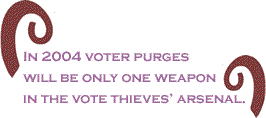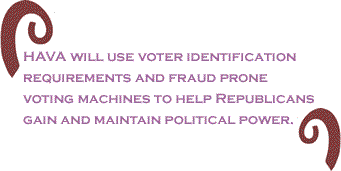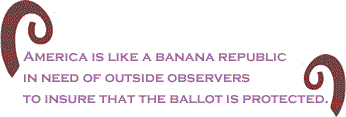
|
|||||||||||||||||||||
|
In the year 2000 America was treated like a pesky third world nation in need of regime change. Those who had been out of power for eight long years chose not to endure that humiliation any longer. They decided to win and they weren’t going to let something as insignificant as democracy stand in the way. As usual the media gave us the wrong story. We were told that the disputed election was caused by hanging chads and butterfly ballots that led Jews to vote for Pat Buchanan. Of course the coup plot was hatched in May of 2000 when 57,000 Floridians eligible to vote were purged from the rolls. Not only was the real story unreported, but the media feeding frenzy over the wrong issue led to the establishment of new and more insidious forms of voting fraud in the United States. When the story of punch cards and touch screens was reported over and over the solution seemed simple. America needed new voting mechanisms to prevent a Florida repeat in future elections. The media said that Congress had to act. The American people joined in the demand for action. However, the result has made vote manipulation easier than ever before. In 2004 voter purges will be only one weapon in the vote thieves’ arsenal. The technology that was supposed to assure the integrity of the electoral process has already undermined it.
Congress enacted the Help America Vote Act (HAVA) in 2002. Shrewdness on the right wing mandates comforting titles for horrific legislation. The Patriot Act has eviscerated civil liberties and the Family Flexibility Leave Act eliminated overtime pay for American workers. HAVA will use voter identification requirements and fraud prone voting machines to help Republicans gain and maintain political power. HAVA requires that states must adopt Florida’s centralized voting roll systems in order to receive funding for electoral improvements. Greg Palast and Martin Luther King III spelled out the perils presented by these new rules. ”The controls on the 50 secretaries of state are few – and the temptation to purge voters of the opposition party enormous. African-Americans, whose vote concentrates in one party, are an easy and obvious target.”
Polling place dramas will not be the only impediment to a fair election. Computerized voting machines have already been implicated in unexpected and suspicious election results in races across the United States. In 2002 polls showed Georgia’s Democratic Senator Max Cleland defeating his Republican challenger, Saxby Chambliss by 49% to 44%. Not only did Cleland lose, but by a margin of 53% to 46%. The new computerized voter machines that also declared a Republican victory in the Governor’s race produced no paper verification of results. The losses to Democrats in Georgia were a surprise, but the system now in place does not allow for a means of determining if fraud occurred.
Another member of the United States Senate has a more comfortable relationship with voting machines and the corporations that make them. Republican Senator Charles Hagel’s 1996 victory in Nebraska was also unexpected. Until 1995 Hagel was chairman of American Information Systems (AIS). When Hagel first ran for the Senate he neglected to disclose that information as required by Senate ethics rules. After a merger in 1997 AIS became Electronic Systems & Software (ES&S). ES&S is the manufacturer of all voting machines in the state of Nebraska and has counted 85% of the votes tallied for Hagel in his 1996 and 2002 campaigns. Hagel’s financial interest in a voting machine company is a minor issue compared to the connection between President Bush and Diebold Inc. of Canton, Ohio. Diebold is one of the largest manufacturers of voting machines in the country. In a 2003 fund raising letter, Diebold CEO Walden O’Dell felt comfortable in declaring his commitment to “…helping Ohio deliver its electoral votes for the president next year." Public response to the letter chastened Mr. O’Dell into pleading ignorance and naiveté. A man who is among the “Pioneers and Rangers” who raise contributions of at least six figures for the Republican party now calls himself a political novice. However, O’Dell was not so chastened that he withdrew his company from consideration for Ohio voting machine contracts.
O’Dell has plenty of help among the Republican political leadership in delivering his swing state to Bush. The Republican Secretary of State, Ken Blackwell, must have the most ironic surname in America. This Black man’s actions do not bode well for the Black residents of his state. If Mr. Blackwell had his way Diebold and other machines would have been in use already. Fortunately other Ohio public servants take their jobs more seriously and are taking their time in determining when and whether to allow Diebold and other voting machine manufacturers to count their votes. Thanks to George W. Bush and his clique America is like a banana republic in need of outside observers to insure that the ballot is protected. Former President Jimmy Carter has monitored elections in nascent democracies all over the world. He may not have to go very far this November. Perhaps he should observe the vote count in his own state of Georgia. Margaret
Kimberley’s Freedom Rider column appears weekly in |
March
18
2004 |
|||||||||
|
|||||||||
|
|
|||||||||
| Printer Friendly Version | |||||||||
 |
|||||||||
| |
|||||||||
| |
|||||||||




























